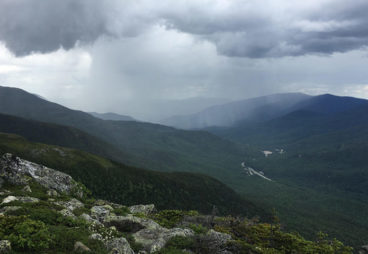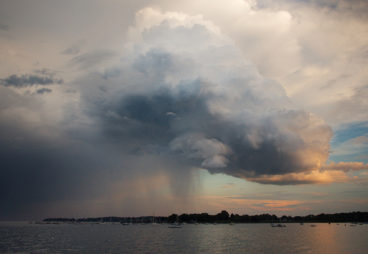

Climate Research
Climate change matters to AMC because it threatens the natural resources and recreational spaces we work to protect.
AMC climate research has evolved from decades of air quality research and builds on long-term monitoring across the region. In the White Mountains and along the Appalachian Trail from Maine to Virginia, we study alpine and forest plant phenology (seasonal timing of plant life cycles), respectively. We also coordinate with the Mount Washington Observatory to evaluate long-term records of weather and climate on the Northeast’s highest peak. In Maine and New Hampshire, we study mountain surface waters that record environmental changes like acid rain, recovery from acidification, and shifting climate. In the Northeast region, we assess how changing winter conditions affect people, natural resources, and recreational opportunities.
Changing Winters
AMC’s region is warming faster and experiencing more extreme events—like heavy precipitation and intense storms—than the rest of the nation. Also, our winters are changing dramatically and affecting outdoor experiences. We studied 100 years of weather data across the region, along with AMC’s own Pinkham Notch long-term monitoring site, and the results are clear:
- We are losing the cold. Even at mid- and high- elevations in the White Mountains, winter and spring are warming faster than other seasons—though all seasons are indeed warming.
- We are losing the snow. With 21 fewer days of snow cover at Pinkham Notch, most of that shift is happening at the end of winter, where snowmelt is shifting earlier by nearly two weeks.
- In the Northeast, winters have become three weeks shorter over the past 100 years. During winter we are seeing dramatic back-and-forth shifts in weather conditions, like record-breaking warmups followed by a return to more normal cold conditions. These “winter weather whiplash” events can set us up for major flooding, harm crops and vegetation, and cause problems for winter recreation.
Next time you’re out skiing, snowshoeing, or winter hiking, you can report snow depth through Community Snow Observations and contribute to snow science.
Mountain Climate and Air Quality
The science underpinning our understanding of how, when, and where climate is changing relies, in large part, on long-term monitoring. AMC has been tracking ozone, acid rain, and haze in the Northeast mountains for decades. The good news is the Clean Air Act is working, reducing emissions and resulting in less air pollution in our region. We need to retain the strength of this important policy tool—with continued reductions—rather than relax the rules and slip backwards, allowing more pollution. There are still impacts from more than half a century of acid rain: despite enacting policies that have reduced acid rain, ecosystem recovery lags behind. And the same smokestacks and tailpipes that emit nitrogen, sulfur, organic toxins, and heavy metals also emit carbon dioxide—the major cause of climate change.
Vegetation Shifts and Phenology
AMC has monitored and mapped alpine and montane plant communities in the Northeast to document baseline conditions and detect potential changes from climate and seasonality shifts. By tracking the timing of plants’ life history events, like flowering times and leaf-out, we can evaluate how changing climate affects AMC’s landscapes. Our modeling work found that three alpine plants are flowering earlier since the 1930s, but only by one to two days. A spatial analysis of alpine treelines in the Presidentials shows that in the past four decades, treelines have advanced upslope by as much as 5 meters (16 feet) per decade (Tourville et al. 2023). We are continuing our long-term alpine plant phenology observation in part by using community science. Recreationists hiking in the Northeast or along the Appalachian Trail can make plant phenology observations with the iNaturalist app, and we’ll use these data in our science.
Research and Monitoring in Maine
AMC is also monitoring how climate is changing in Maine's 100-Mile Wilderness , and climate change's impacts on the region's forests, freshwaters, and people. Through our Maine Woods Initiative, we've installed and maintained sensors that measure air, soil, stream, and lake temperatures as well as snow depth and phenology. We host climate-sensing hubs and arrays aimed at microclimate patterns and measure lake temperatures using automated dataloggers. Stream temperature sensors support our on-the-ground stream habitat projects aimed at improving connectivity for fish and other organisms. All of these data points enhance AMC's climate-related research across the region.
Our work is carried out in collaboration with the INSPIRES team at the Universities of Maine, New Hampshire, and Vermont, Lake Stewards of Maine, and the Maine Department of Environmental Protection.
Learn more about AMC's climate research
Where’s Winter? A Season of Change in the Northeast
Deep snows and freezing temperatures are two things that scream “winter” in the Northeast and New England. It’s not unusual to be scraping ice off cars for six months...
ExploreThe Effects of Climate Change
The greenhouse effect has caused the Earth’s average temperature to rise 1.62 degrees Fahrenheit since such records were first kept in the late 19th century. This may not seem...
ExploreClimate vs Weather: How They Differ, How They’re Connected
Each winter, when snow blankets a normally mild region of the country or a polar vortex sinks large swaths of America into a deep freeze, the questions begin....
Explore

